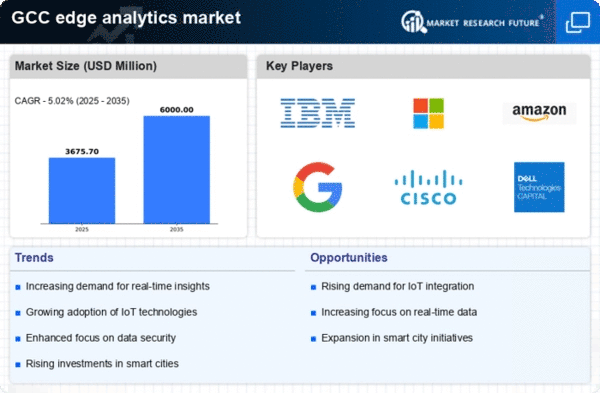Emphasis on Data Sovereignty
Data sovereignty is becoming a critical concern for organizations operating in the GCC, influencing the edge analytics market. As regulations surrounding data privacy and protection become more stringent, businesses are increasingly seeking solutions that allow them to process data locally. Edge analytics offers a viable approach to address these concerns, enabling organizations to analyze data at the source while ensuring compliance with local regulations. This trend is likely to drive investments in edge analytics technologies, as companies prioritize data security and sovereignty. The edge analytics market is expected to see a notable increase in demand from sectors such as finance and healthcare, where data sensitivity is paramount. This focus on data sovereignty may lead to a market growth rate of around 20% annually in the coming years.
Expansion of 5G Infrastructure
The rollout of 5G networks across the GCC is significantly impacting the edge analytics market. With enhanced connectivity and reduced latency, 5G technology enables more efficient data transmission from edge devices to analytics platforms. This infrastructure expansion is expected to facilitate the deployment of advanced edge analytics solutions, allowing organizations to harness the full potential of their data. The edge analytics market is likely to benefit from the increased bandwidth and speed offered by 5G, which can support a higher volume of data processing at the edge. As a result, businesses are anticipated to invest heavily in edge analytics technologies to leverage the advantages of 5G, potentially leading to a market valuation exceeding $1 billion by 2026.
Growing Adoption of Smart Devices
The proliferation of smart devices in the GCC is driving the edge analytics market forward. As more organizations adopt IoT-enabled devices, the volume of data generated at the edge continues to rise. This influx of data necessitates robust analytics solutions capable of processing and analyzing information in real-time. The edge analytics market is poised to capitalize on this trend, as businesses seek to derive actionable insights from the data collected by smart devices. Furthermore, the integration of edge analytics with smart devices can enhance operational efficiency and improve customer experiences. It is estimated that the number of connected devices in the region will reach over 1 billion by 2025, further underscoring the potential for growth in the edge analytics market.
Increased Demand for Real-Time Data Processing
The edge analytics market is experiencing a surge in demand for real-time data processing capabilities. Organizations in the GCC are increasingly recognizing the value of immediate insights derived from data generated at the edge. This trend is driven by the need for timely decision-making in various sectors, including manufacturing, healthcare, and transportation. According to recent estimates, the edge analytics market in the region is projected to grow at a CAGR of approximately 25% over the next five years. This growth is indicative of a broader shift towards decentralized data processing, which enhances operational efficiency and reduces latency. As businesses strive to optimize their operations, the edge analytics market is likely to play a pivotal role in facilitating this transformation.
Rising Need for Enhanced Operational Efficiency
The quest for enhanced operational efficiency is a primary driver of the edge analytics market in the GCC. Organizations are increasingly recognizing that leveraging edge analytics can lead to significant improvements in productivity and cost savings. By processing data closer to its source, businesses can reduce latency and bandwidth costs associated with sending large volumes of data to centralized cloud servers. This shift not only streamlines operations but also enables quicker responses to market changes. The edge analytics market is likely to see a surge in adoption as companies across various sectors, including logistics and manufacturing, seek to optimize their processes. It is projected that investments in edge analytics solutions could exceed $500 million in the GCC by 2027, reflecting the growing emphasis on operational efficiency.
















